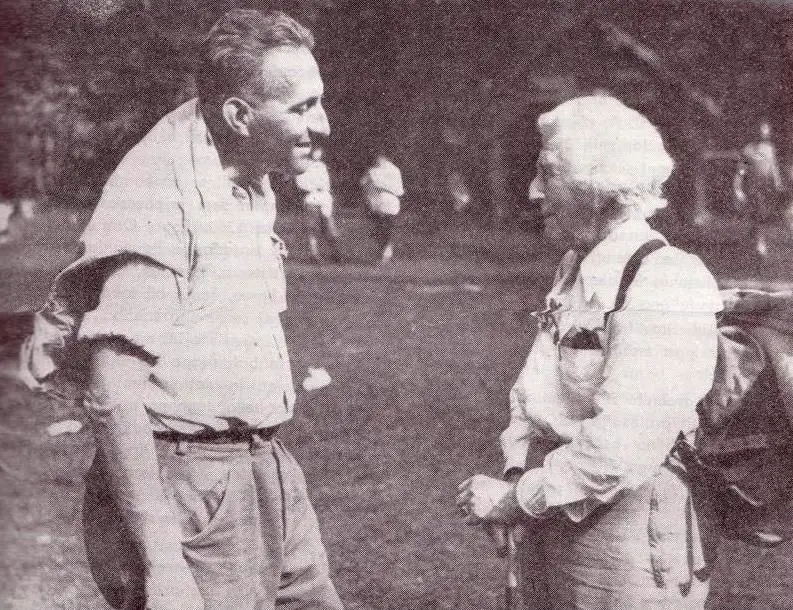News
STA, 5 February 2019 - STBE, a company which is said to own the airline Adria Airways brand, has been absorbed by Adria Airways, Slovenia's flag carrier in German ownership. The move increases the airline's share capital and changes its ownership, the business newspaper Finance reported on Tuesday, citing publicly available documents.
Adria's share capital has thus increased by EUR 1.5m to EUR 3.28m and its majority ownership has passed to Stefan Beulertz, until now the sole owner of STBE.
According to news portal Siol, STBE had bought Adria's brand from Adria a while ago for EUR 8m.
Before Beulertz became its majority owner, Adria was in sole ownership of AA International Aviation Holding, a company within the German turnaround fund 4K Invest, which bought Adria from the Slovenian state in 2016.
The airline said its strategy and day-to-day operations would not change under the new ownership. "The merger by acquisition of STBE is one of the measures to improve the company's financial strength and performance," Adria told the STA.
Struggling with liquidity issues, Adria was supplied with EUR 4m in fresh capital at the end of 2018.
Its owners announced another EUR 10m capital hike in the first quarter of this year and the move is believed to be a part of this operation.
Last year, Adria was scrutinised by the Civil Aviation Agency for speculation of insolvency, but the agency said last month the airline was able to secure long-term solvency, so it kept the air operator certificate.
Meanwhile, Finance cited an unofficial source saying the company had generated an operating loss of EUR 14-15m last year.
Adria neither confirmed nor denied the report, reiterating it would inject the airline with EUR 10m in fresh capital by the end of March.
Adria will phase out flights to Moscow and Düsseldorf this week and terminate cooperation with German airport Paderborn-Lippstadt.
"We have not managed to agree further conditions for air services under which we could carry on the cooperation [with Paderborn]... All the other operations of Adria Airways remain unchanged," the company told the STA.
STA, 5 February 2019 - The flooding caused by heavy rains over the past weekend in the south-west of Slovenia damaged infrastructure at the Škocjan Caves, Slovenia's oldest UNESCO world heritage site, prompting their temporary closure.
According to a post on the Škocjan Caves Facebook profile, the water level at one part of the caves, the Šumeča Cave, rose by over 60 metres. "The last comparable flooding was recoded in 1975," it said.
While the infrastructure of the caves was badly damaged by the swollen river Reka, the caves as such remain undamaged.
The Škocjan Caves Park director, Stojan Ščuka, put the early cost estimate at roughly EUR 50,000. He told the STA that the caves would be reopened to visitors on Friday.
He said the extent of the flood was comparable to the one in 1965. The biggest problem was the material deposited by the river such as branches, logs and mud.
The biggest damage was done to the lighting and electrical wiring, as well as to the fencing and in parts of the walls.
But before repairs can begin, the debris deposited by the river will have to be cleaned up first. There is up to a foot or more mud on some of the paths.
Roughly 50 people, including firefighters, environmentalists, seasonal labour and students, are being involved in the clean-up effort today.
Ščuka does not expect a major loss of revenue due to the closure because the number of visitors is at its lowest at this time of year.
The caves attracted more than 184,000 visitors last year.
STA, 4 February 2019 - Foreign Minister Miro Cerar announced on Monday he would propose to the government that Slovenia recognise the leader of the Venezuelan opposition, Juan Guaido, as Venezuela's interim president with the intention of Guaido calling an early presidential election. The government is to decide on the proposal on Thursday at the latest.
Cerar made the announcement after a closed-door session of the parliamentary Foreign Policy Committee, which was to be briefed on Slovenia's lawsuit against Croatia over the border arbitration situation at the EU's Court of Justice.
Cerar spoke of a dramatic situation in Venezuela, which is experiencing a serious economic, social and humanitarian crisis. Three million people have emigrated in the last five years and human rights are not respected, he told the press.
He said that the recognition of Guaido would be "exclusively for the purpose of ... calling a new, fair, free and democratic election", and added that the final decision remained to be made by the Marjan Šarec-led cabinet.
"It's a fact that Mr. Maduro did not win in such an election. He won in an undemocratic election, meaning unfair, not free and lacking transparency," Cerar said.
Thus Slovenia needs to join the EU in helping in humanitarian efforts as well as, if necessary, step up sanctions against the current power holder.
"Above all, Slovenia needs to react in the right way. This means recognising the power holder that can and wants to call new elections as soon as possible, so that people can be helped, so that the rule of law, democracy and respect for human rights are restored."
He argued this would help restore peace and stability and help make sure that "people will not be without medicine and food, that they will not flee or fear state violence".
Cerar added that while the EU was united in the points listed, it is not the domain of the EU as a whole, "or this has not been the usual practice so far", to recognise power holders in individual countries". "This is now being left to individual countries to decide," he said.
TWEET
Meanwhile, the press was also addressed by Foreign Policy Committee chair Matjaž Nemec, who said that he in a way identified with Cerar, but that at the same time he saw himself confronted with a number of questions.
"Remembering how democracy was used as a pretence to approach the situation in Ukraine or the Arab Spring ... or the situation in Syria, I fear and warn that this could mean a new hot spot in South America. There are major interests involved," Nemec said.
While agreeing that the current leadership in Venezuela is incapable of governing, Nemec fears what the alternative could bring.
Several European countries recognised Guaido, the parliamentary speaker, as interim president today after Venezuelan President Nicolas Maduro rejected the ultimatum to call an election by Sunday. Spain, Great Britain, France, Austria and Germany were among the first to do so.
<blockquote class="twitter-tweet" data-lang="en"><p lang="sl" dir="ltr">.<a href="https://twitter.com/vladaRS?ref_src=twsrc%5Etfw">@vladaRS</a> bom predlagal, da <a href="https://twitter.com/hashtag/Slovenija?src=hash&ref_src=twsrc%5Etfw">#Slovenija</a> prizna predsednika Nacionalne skupščine <a href="https://twitter.com/jguaido?ref_src=twsrc%5Etfw">@jguaido</a> za začasnega predsednika Venezuele, z namenom izvedbe svobodnih, poštenih in demokratičnih predsedniških volitev. <a href="https://twitter.com/hashtag/Venezuela?src=hash&ref_src=twsrc%5Etfw">#Venezuela</a> <a href="https://twitter.com/MZZRS?ref_src=twsrc%5Etfw">@MZZRS</a> <a href="https://t.co/Q9DdsCMjD0">pic.twitter.com/Q9DdsCMjD0</a></p>— dr. Miro Cerar (@MiroCerar) <a href="https://twitter.com/MiroCerar/status/1092477936177954818?ref_src=twsrc%5Etfw">February 4, 2019</a></blockquote>
<script async src="https://platform.twitter.com/widgets.js" charset="utf-8"></script>
STA, 4 February 2019 - Slovenia believes it can achieve sustainable public finances without having to hinder economic growth, the Finance Ministry told the European Commission on Monday, as it sent clarifications of its 2019 budgetary plans to Brussels.
The government sent to the Commission the draft supplementary budget for this year after it adopted it on 24 January.
However, last Friday the Commission requested clarifications about whether the 2019 budget plans were in line with EU rules.
In the document sent to Brussels today, the Finance Ministry said the government would carry on with activity designed to keep public finances sustainable, which would be done so as not to hinder economic growth.
The ministry explained that the fiscal rule had been the main guiding principle the government had taken into account in forming economic policies.
In doing so, it strived to preserve a nominal surplus, and consequently sustainable public finances in the medium term.
In this sense, Slovenia pursues an adequate ratio between the stability of public finances, and the care for its citizens and the country's development.
Slovenia will therefore continue with the activity designed to achieve long-term sustainability of public finances in line with the rules so that it does not hinder economic growth.
It will not lower expenses nor investments, but at least keep them at the current levels, at the same time facilitating a certain level of social security.
"For Slovenia, it is vital to preserve economic activity and raise productivity while keeping the general government debt at an adequate level."
In asking Slovenia to provide clarifications about its 2019 budget plans, Brussels acknowledged the planned surplus was to stand at 0.55% of GDP and that due to solid economic growth public debt was to drop to 66% of GDP by the end of the year.
But what worried it was the fact that the budget also envisaged a 4.5% nominal growth in public spending, which exceeds the recommended 3.1% growth ceiling.
The 0.55% of GDP figure refers to all public finances - the state budget, the health and pension purses and municipal budgets, whereas the surplus for the state budget alone is planned at 0.4% of the GDP.
Brussels said today it had received the Slovenian response, but would respond to it as part of the European semester winter package, expectedly at the end of the month.
Below is a review of the headlines in Slovenian dailies for Tuesday, February 5, 2019, as summarised by the STA:
DELO
Looming postal strike
"Postmen across Europe no longer just postmen": The two postal workers' trade unions are expected to decide this week whether employees at the national postal company will go on strike. (front page, page 9)
Germany's budget
"Germany's balanced budget melting": Germany's Finance Minister Olaf Scholz is reported to be projecting a budget deficit of almost EUR 25bn by 2023. (front page, page 6)
Defence procurement
"Have Germans lobbied for the deal with politics?": The opposition New Slovenia (NSi) and Democratic Party (SDS) want to know why the purchase of Boxer APCs has been halted; the NSi denies succumbing to lobbying. (front page, page 2)
Alpine World Ski Championships
"Going strong and decisively for medal today": Slovenia's Ilka Štuhec will be defending the title of world champion in today's downhill race in Aare. She likes the piste. (front page, page 18)
DNEVNIK
Personal data protection
"Agricultural Markets Agency sent data to wrong recipients": The Agency for Agricultural Markets and Rural Development has sent notices containing sensitive data of 1,180 subjects to wrong addresses in a similar security breach as the NKBM bank recently. (front page, page 2)
Quality of school meals
"Quality producers are costly": The Education Institute says that the meat and other food products procured by schools and kindergartens are safe. However, the price continues to rank a major factor in public procurement so it is impossible to rule out poor quality food ending up in school meals. (front page, page 3)
Plagiarism in theatre
"Boris Kobal no longer Šentjakobsko Theatre director": The management board of the amateur theatre Šentjakobsko Gledališče sacked Boris Kobal as director after he was found to have plagiarised an Italian play. (front page, page 25, commentary 14)
FINANCE
Ownership changes at fuel retailer
"Ownership changes in Petrol?": Slovakia's J & T has been unable to increase or sell its 13% stake in Petrol, Slovenia's fuel retailer and energy company. It is now changing its tactics. (front page, pages 6, 7)
Public finances
"How did the government collect an extra billion and how is spending it": A consolidated budget account for last year shows where the government collected record tax revenue in history. (front page, pages 2, 3)
Labour tax
"A move to cut tax on labour at last?": Business associations are demanding a reduction of levies on wages, while government officials are telling them they are being heard. Does this mean action will be taken at last? (front page, pages 4, 5)
VEČER
Cancer
"Increasing number of cancer cases": On World Cancer Day, observed yesterday, Slovenian experts warned that cancer incidence in the country has doubled in the past 20 years to about 12,000 new cases a year. (front page, page 4)
Business-to-government meeting
"Will govt hear entrepreneurs?": Prime Minister Marjan Šarec promised businessmen gathered in Postojna yesterday that the government was willing to give them an ear, but that its duty was to everyone not just one group of people. (front page, pages 2, 3)
Democratic Party
"Media blamed for lack of success": As the executive committee of the opposition Democratic Party (SDS) meets today the question is likely to come up why the party cannot make a breakthrough. (front page, page 3)
Prime minister
"Šarec has leadership talent": This is the view of Danica Purg, president of the IEDC-Bled School of Management. (front page, page 5)
Fanny Susan Copeland was a remarkable person whose life serves as a curiosity and inspiration. A British woman who was born in Ireland in 1872, grew up in Scotland, and moved to Slovenia in 1921, where she spent most of the rest of her life, dying at 98 in 1970, and buried at the foot of Mount Triglav.
Although she wrote an autobiography it was never published and will remain in copyright limbo until 2020. One person who’s seen this memoir is Eric Percival, whose great-great-great-grandfather, Fred Holloway, knew Fanny’s father, Ralph Copeland, once the Astronomer Royal for Scotland, with the two men meeting near Manchester in the early 1860's. Percival put together the original post that sparked my interest in Ms Copeland, and also kindly supplied some of the pictures that accompany this story. Unless otherwise stated, the facts set out below are also drawn from his account of her life, as based on her own and other reports.
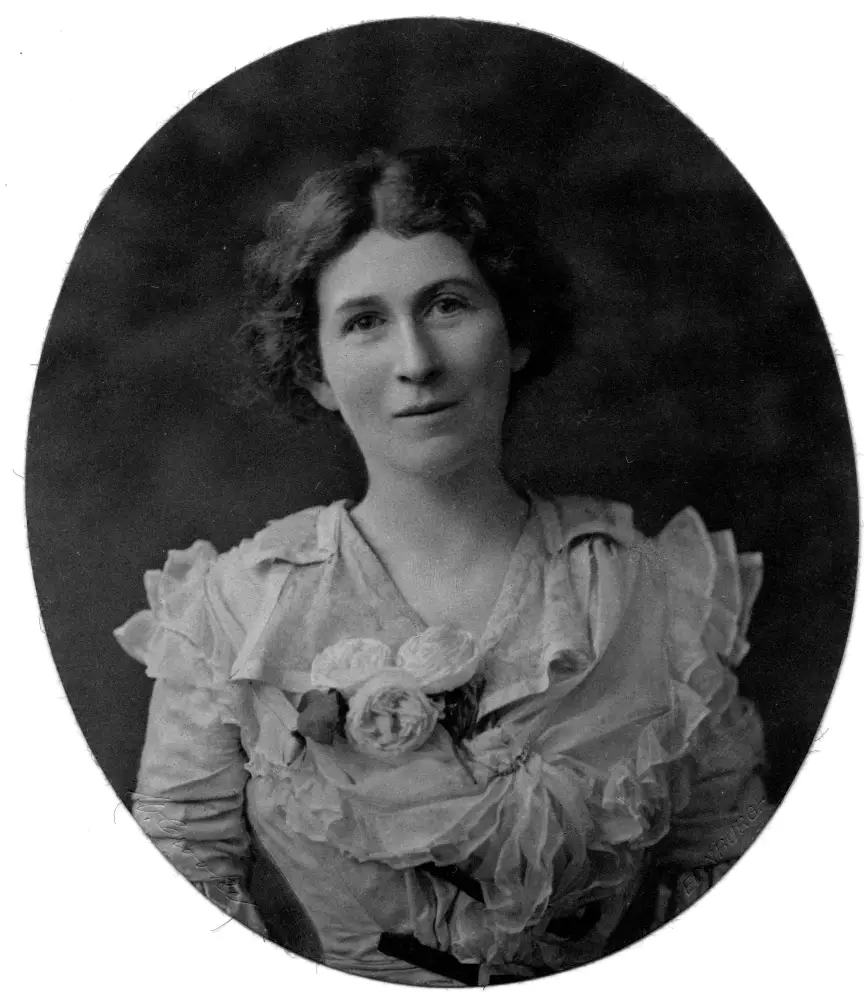
Although British by birth, Fanny was a thoroughly European woman, learning French and German as a child and being educated in Berlin shortly after turning 13. She also learned Latin, Italian, Danish, Norwegian and – due to her father’s interest in the Balkans – Slovenian. This connection with the country would be enough to get our attention, but Ms Copeland holds it because she bucks the standard narrative in terms of when and how one can make a new life for oneself. A brief outline of that life is as follows.
Fanny got married in 1894, at the age of 22, to escape her mother, but her husband was a 36-year old man who she never really liked. The couple had three children and then separated in 1908, finally divorcing in 1912, when Fanny was 40.
She developed a stronger connection with what would eventually become Yugoslavia soon after this, during the First World War, when she supported herself by doing translating for London-based South Slavic organisations. As part of this she translated Bogumil Vošnjak’s Bulwark against Germany: The fight of the Slovenes, the western branch of the Jugoslavs, for national existence, as well as serving as translator for the South Slavic delegation at the Paris Peace Conference.
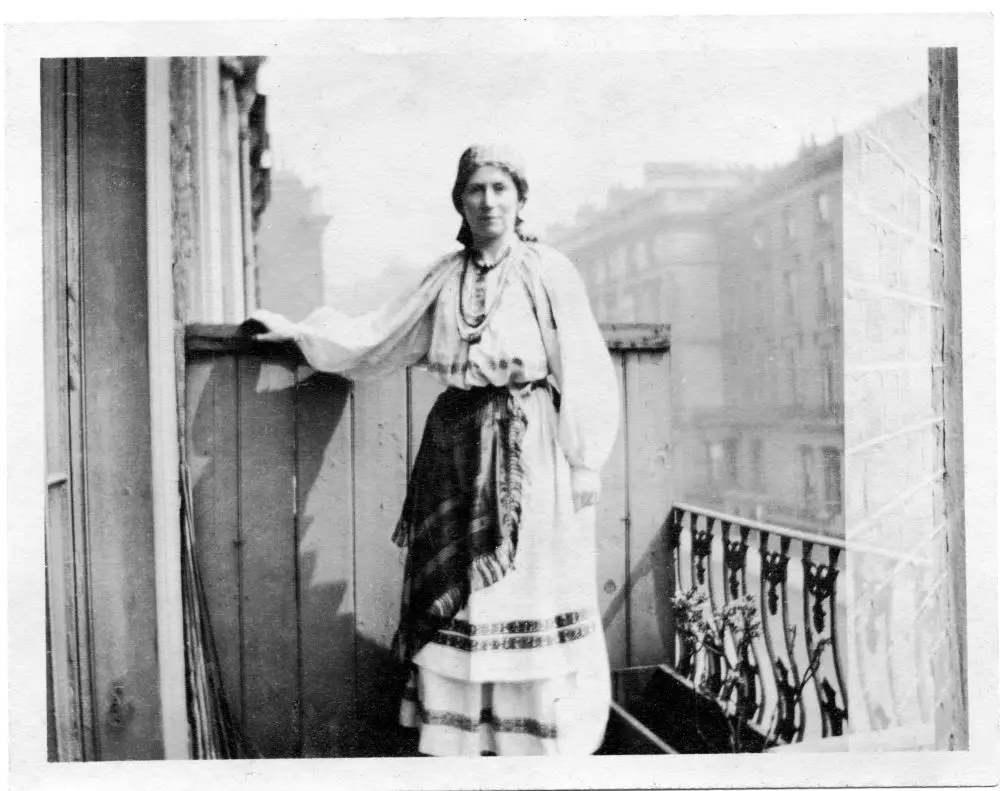
In "traditional costume"
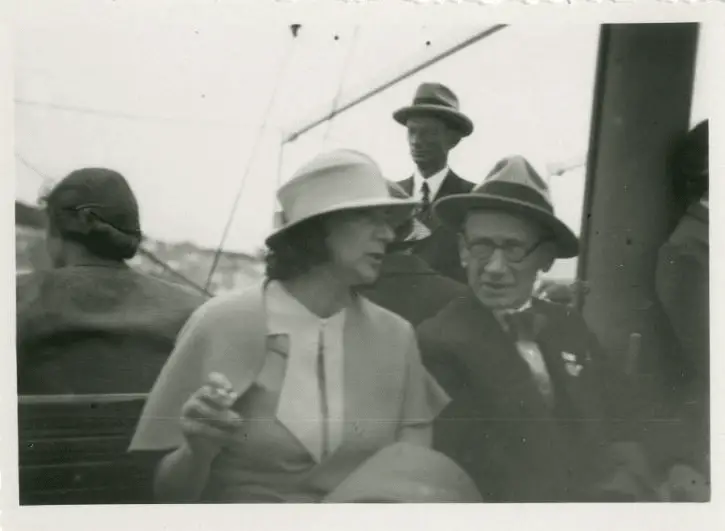
With Oton Župančič at the Congress of Dubrovnik in 1933
Ms Copeland then moved to Ljubljana in 1921, aged 49, when the city was part of the newly formed Kingdom of Serbs, Croats, and Slovenes. She was hired as a lecturer in English at the University (which itself only opened in July 1919), a post she held until 1941, when the Germans invaded. At this point, aged 69, she was arrested by the Gestapo and handed to the Italians, who moved her to Trieste, then to Arezzo and finally Bibbiena (in Etruria), where she spent the rest of the war “in open confinement”.
In 1953, aged 81, she finally moved back to Ljubljana. The death of her brother meant that she now had some savings, and thus Fanny Copeland lived in Hotel Slon for the rest of her life, continuing to work as a writer and translator.
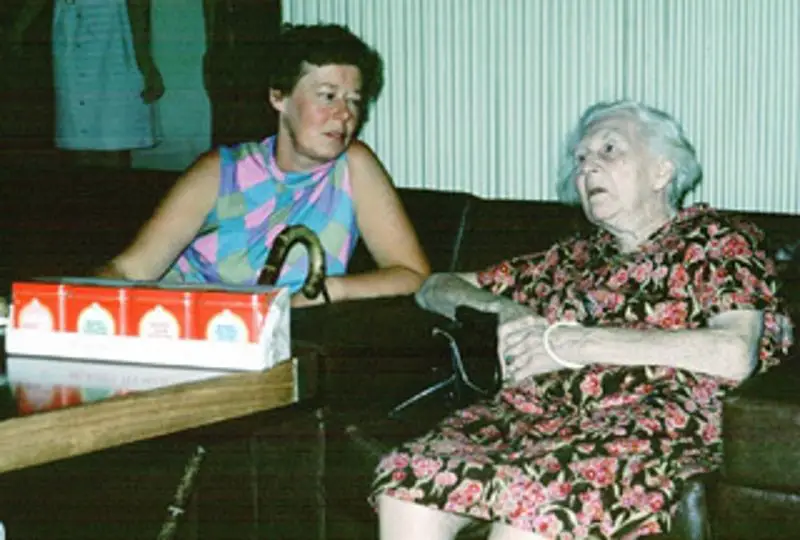
Ms Copeland, right, in the Hotel Slon, late 1960s
A pioneer of mountaineering tourism in Slovenia
But Fanny Copeland isn’t just a fine example of a person who didn’t let their gender or age dictate what they should be doing and when, or of someone who managed to successfully integrate themselves into a new country, as she also played a key role in the development of Alpinism as a local tourist offering, and in the promotion of Slovenia as a tourist destination. This section thus draws from an article by Janet Ashton called “Buried at his feet”: Fanny Susan Copeland, Triglav and Slovenia, and from another, Fanny Copeland and the geographical imagination, by Richard Clarke and Marija Anteric, both of which are recommended for more detail.
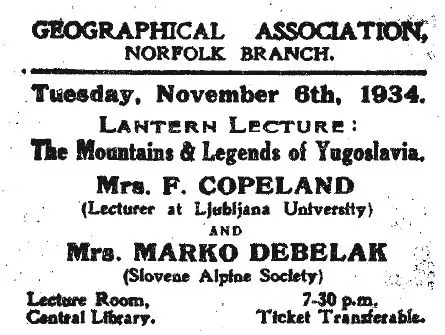
Ms Copeland felt a great attraction for the Julian Alps, and Slovenia the Slovenes in general, claiming they were the most Scottish of the Yugoslav communities, perhaps because of the mountains, long dominance by other powers, and characteristics of pragmatism and frugality.
She first climbed Triglav in the 1920s, not having taken up serious climbing until her 40s, and did so for the last time in 1958, just before her 87th birthday. She also wrote two books on the Julian Alps, Beautiful Mountains: In the Jugoslav Alps (1931), and A short guide to the Slovene Alps (Jugoslavia) for British and American tourists (1936). As she said in 1957, this was done in the “hope of attracting to Slovenia tourists of all types, from summer visitors in search of little-known beautiful and inexpensive Alpine resorts to Alpinists in search of accessible mountain ranges not yet wholly exploited or explored”.
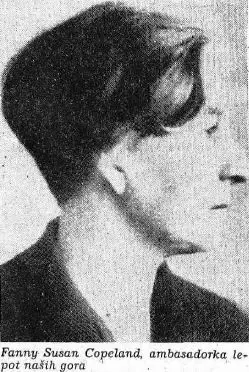
"Ambassador for the beauty of our mountains". www.gore-ljudje.net
Such efforts to reveal what in those days was still a very hidden gem were not without their obvious dangers, as she noted in a much earlier letter from 1923 when commenting on one of her many trips up Triglav: “It is an interesting walk, but as an expedition it is badly spoilt by the path having been made fool-proof. Result, every holiday is made hideous by hundreds of trippers, and the average person has to wait for a holiday to go up.”
Slovenski planinski muzej:- Fedor Košir, president of the Alpine Association of Slovenia and Fanny Copeland.
As mark of respect for her work to promote the Julian Alps, and to establish Triglav National Park, when Fanny Copeland died her funeral was organised by the Mountaineering Union of Slovenia. She was buried in the cemetery of the village church in Dovje, where you can still see her simple grave, as shown below.
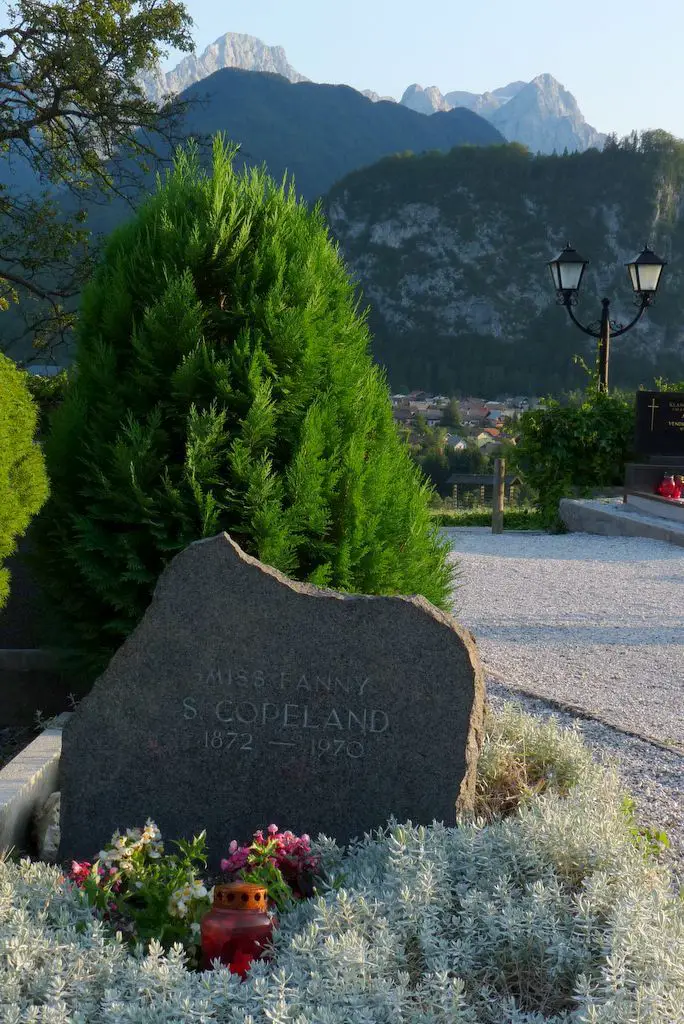
Wikipedia - Miran Hladnik CC-by-2.5
As Copeland wrote in 1931:
By fixed custom those that perish on Triglav are buried at his feet. In the pretty village church of Dovje, opposite the entrance of the stately Valley of the Gate (Vrata– truly a gate to be called Beautiful) they lie side by side. I think they would have it so. The long shadows of the regal avenue of peaks, down which they passed to their last adventure, sweep over their graves as the days and the years roll by; on All Souls’ day the mountaineers bring them pious offerings of prayer and lights, and from their tombstones their names cry greeting and warning to the hosts that go up year by year to visit the mountains, - greeting to the many who go up by the blazed trail where every danger spot is made safe with iron bolt and wire rope, to protect the unwary and put heart into the timid, - greeting to the few who seek, like themselves, to win the goal without guidance save the love of the heights, and no company except the extreme mysteries of life and death – greeting to the cragsman and the lover, to schoolboy and hunter, to smuggler and spy, and the ski-shod friend of the snows….
So if you find yourself in Hotel Slon, on Mount Triglav or by the village of Dovje, spare a thought for the remarkable Fanny Copeland, a woman who not only did as much as anyone else working in English to make the case for a separate Slovenian identity, one distinct from land’s association with the Habsburgs, Slavs and Serbo-Croatians, but also did much to bring the beauty of the land to a wider audience, and to share the best of her adoptive home with the world.
Postscript
As to what life was really like under Tito for a woman born to the academic elite under Queen Victoria, Copeland addresses this at the end of her autobiography, with a postscript to the reader:
But have you really found good reasons to go and live in a ‘communist’ state? This was a question I was often asked soon after my return to Ljubljana. Well - for one thing it depends on what you mean by 'Communism'. If you mean a totalitarian regime then my reply is that no Yugoslav would put up with such a system… The Yugoslavs are stout individualists, but they appreciate law and order. Ask any British tourist who has visited Yugoslavia in recent years.
All our stories on mountaineering in Slovenia can be found here
STA, 4 February 2019 - Slovenska Matica, the nation's oldest cultural and scientific society, is celebrating its 155th anniversary with an open house on Monday. A number of lectures, debates and presentations are taking place. President Borut Pahor addressed the main ceremony.
Slovenia is confronted with the question of how to build its national character without it turning to national arrogance or nationalism, Pahor said in his address, adding that this was a sensitive and tough intellectual and political issue.
At the same time, Slovenians need to ask themselves "how can we build stable pillars of sovereignty without creating the impression that we started to doubt the European idea and were getting ready for its downfall".
He pointed to the important role Slovenska Matica played in this context and noted that these issues needed to be addressed with great sensitivity, especially by politicians.
Slovenska Matica president Aleš Gabrič said in his address that the society wanted to continue to do the work it set out to do 155 years ago: "to bring into the treasure trove of the national cultural wealth that what makes the nation its best".
The society was established in Ljubljana with donations of academics, tradesmen and entrepreneurs with the objective to print academic and scientific books in Slovenian.
Slovenian was not a language of academia, as Slovenian lands were a part of the Austrian Empire up until its dissolution following World War I.
When it was established, the society's mission was to raise the level of education across the nation and create Slovenian vocabulary in a variety of fields.
The society's heyday was in the early 20th century, when the books it published reached high circulation and the society nurtured frequent contacts with universities and academic societies from London to St Petersburg.
Today, Slovenska Matica is the second oldest Slovenian publisher after Mohorjeva Družba. It organises science meetings and conferences addressing issues faced by the Slovenian culture and society. It is fully funded by the state.
STA, 4 February 2019 - Three Slovenian coach companies have been fined nearly EUR 3.1m by the Competition Protection Agency due to collusion in a 2010 public tender for intercity passenger services, with three more left off the hook for cooperating with the competition watchdog.
Deutsche Bahn subsidiary Arriva Alpetour, industry consolidator Nomago and Integral Brebus, a smaller firm operating out of Brežice, have been ordered to pay the fine.
The coach operators were found to have rigged a public tender by submitting bids for individual concession areas, avoiding outbidding each other.
Indeed, it was discovered that they had agreed in a series of meetings and email exchanges how they would subcontract individual services to each other so that they retained their market shares.
The public tender was cancelled because the bids were too high.
Three other operators - Arriva Štajerska, Arriva Dolenjska in Primorska and Veolia Ljubljana - escaped fines totalling almost a million euro by working with the agency and providing additional evidence about collusion.
This is the first example of the agency being lenient on violators of competition rules in Slovenia.
"The point of the leniency programme is to motivate the participants of a cartel to work with the agency in the detection of actions that represent one of the worst forms of the restriction of competition," the agency said.
The law stipulates that companies engaging in anti-competitive behaviour may receive fines of up to 10% of their turnover, depending on the gravity of the offence.
The three companies that received fines have announced appeals, which will be processed by the Ljubljana Local Court, but an interim decision in which the agency proved the existence of collusion is already final.
STA, 4 February 2019 - Most public sector employees will benefit from a rise as they get their January payslips this month. However, the pay deal struck at the end of last year will also result in costlier public services.
Citing higher labour costs, some of the retirement homes and kindergartens have already hiked up the prices of their services, while higher wages may yet translate into higher supplementary health insurance premiums and in-home support services. However, not all hikes can be blamed on higher wages.
Prices of services at retirement homes are as a rule adjusted once a year, that is on 1 March. An additional adjustment is possible if labour costs have gone up by more than 1.5% since the last adjustment.
The Labour Ministry says that labour costs resulting from annexes to collective bargaining agreements increased by about 4% from 1 January on. These costs "represent about 50% in the price structure, which at 4% pay rise translates into 2% higher price of services".
According to ministry data, 60% of service providers opted for adjustment of prices of their services as of 1 January, following the ministry's recommendation that the average price increase should not exceed 2%.
However, they will be able to introduce additional hikes on 3 March due to changes in other elements of the price such as the costs of material, services, investment maintenance, amortisation and financing.
The ministry expects that the providers who did not adjust their prices at the beginning of the year, will do so now by an average of between 2% and 3%. Those who did would be able to increase prices by a further 1% on 1 March.
Nursery school fees are also going up. City councils in municipalities such as Ptuj, Velenje and Kranj, have already given the go ahead for price hikes of between 3% and 10%.
Ptuj Mayor Nuška Gajšek has linked the rises directly to the public sector pay deal, noting that labour costs represent more than 80% of the fee at nursery schools.
She says that municipalities are underfunded even without the burden of the latest pay rise, so part of the increase in costs would have to be covered by parents.
"If we wanted to subsidise the increase in prices, it would cost the municipality more than 400,000 euro a year, on top of the 3.4 million we already allocate for the purpose."
Velenje will allocate an additional EUR 500,000 for the increase in the cost of nursery schools. The increase in fees affecting the parents will depend on their income and the age of their child.
Parents in the median wage bracket will be paying EUR 14.92 more a month for first age group children, EUR 11.67 more for children in combined age groups classes and EUR 11.08 more for oldest children. The lowest income parents will pay EUR 3-4 more and top income parents up to EUR 32.84 more.
Several other municipalities are considering raising nursery school fees, while Maribor and Ljubljana will wait for calculations after the kindergartens have paid out January pay, before taking decisions.
The Education Ministry says prices of nursery school fees go up at different rates from one municipality to another and that they are not affected by higher wages alone.
The ministry is thus considering amending the pricing rules to "align individual elements of the price and thus prices", however it will also need to consider the position of local communities and nursery schools.
Similarly, one of the trade unionists who agreed the pay rises, Branimir Štrukelj of the KSJS confederation, says that some of the providers have used the pay rise to increase the prices of their services in order to deal with their problems.
He told the STA that some private providers used the increase in the minimum wage to hike up their prices by 20%. He rejected the reasoning that trade unions could be responsible for the growing prices in any way.
Fellow trade unionist Jakob Počivavšek noted that the government had committed to cover the higher pay costs for the services which are paid for from the budget directly or indirectly.
The Labour Ministry said it was seeking to agree an increase in the funds that the public health insurer pays to retirement homes for health services.
Local communities also urged the government to secure additional funds to municipalities to cover for higher labour costs. They want the per capita funding to increase beyond the EUR 20 agreed in November 2018.
The government responded by saying that the November agreement included a commitment for the government and municipalities to assess the impact of the public sector pay rise on municipality finances in mid-year.
The government has also appointed a taskforce comprising representatives of government departments and municipality associations to examine municipality legislation and their responsibilities and to draw up measures to reduce their costs.
STA, 4 February 2019 – The newspaper Delo looks at Slovenia's housing policy in Monday's front-page commentary noting that "the fundamental problem of housing policy at the national level is that it does not exist."
Slovenia designed a housing policy in the second half of the 1990s, but most subsequent policy changes have been ineffective.
The last building boom took place a decade ago, when the state finished major works on the motorway network and construction giants needed new projects. Many projects failed miserably because of the economic crisis.
"But housing construction should not be the result of booms, it should be framed by a clear housing policy underpinned by expected demographic trends," the paper says in Where Are the Foundations of Apartments?
The commentator points to the forthcoming launch of the Magna paint shop near Maribor and wonders whether anyone has considered where all the new workers will live and how they will get home, and whether the appropriate infrastructure to serve them will be built.
"This should not be perceived as a problem to be solved, but rather as a business opportunity for the state to extract the most out of every project.
"The fact is, tax revenue depends more on this auxiliary infrastructure - exploitation of all external effects of an investment - than tax inspections and higher tax rates."
STA, 3 February 2019 - Out of more than 142,000 companies active in Slovenia in 2017, almost 95% were micro companies, and they employed more than a third of the total of 627,000 all employees in companies. Most of the revenue, over two-thirds, was generated by large companies, Statistics Office data shows.
Large companies employed 27.3%, medium-sized companies 19.1% and small companies 18.6% of all workers.
The exact number of companies active in 2017 was 142,574, of which 94.7% were micro companies, classified as entities with up to nine employees.
Small companies (with up to 49 employees) represented 4.3%, medium-sized companies (up to 249 employees) 0.8% and large companies (250 of more employees) 0.2% of all companies.
All Slovenian companies generated a total of EUR 96bn in revenue in 2017, of which 34.3% was generated by large companies, which were followed by medium-sized companies (23.2%), micro companies (21.8%) and small companies (20.7%).
Out of the total added value of EUR 23bn, 35.8% was generated by large companies, 23.5% by micro companies, 21.2% by medium-sized companies and 19.5% by small companies.
The largest share of sales revenues was generated by industrial companies (40%), which were also at the top in terms of the generated added value (43%).
The least sales revenues and added value sector-wise was generated by construction companies, 5% and 6%, respectively.
Industrial companies, which include mining and quarrying, manufacturing, electricity, gas, steam and water supply, and waste water and waste management companies, increased sales revenues by 11% compared to 2016.
There were almost 20,000 companies in manufacturing in Slovenia in 2017, with sales revenues increasing the most in the motor vehicle segment (by 29%), and decreasing the most in the production of clothing (by 14%).
The data can be explored in more detail here


